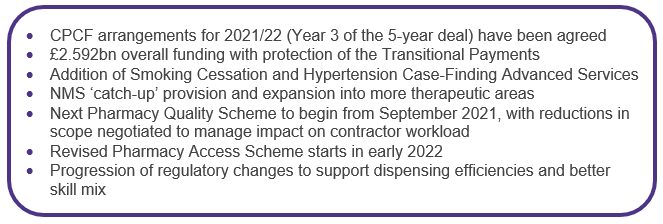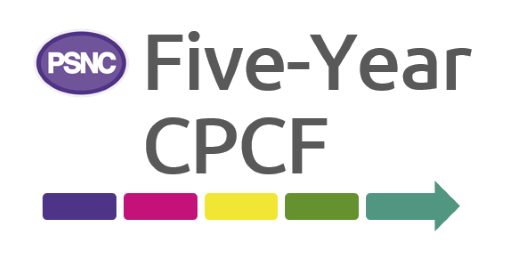Contractor Announcement: CPCF arrangements for 2021/22 agreed
Announcement summary:

Arrangements for the Community Pharmacy Contractual Framework (CPCF) in 2021/22 have been agreed between PSNC, NHS England and NHS Improvement (NHSE&I) and the Department of Health and Social Care (DHSC), in line with the five-year CPCF deal.
This follows an intensive period of negotiations, lasting around three months. During this time, PSNC’s Negotiating Team fought hard to gain concessions on a number of key issues, all with the backing of the full Committee who eventually voted to accept the deal by an overwhelming majority.
Overview and key wins for pharmacy
In negotiations on the Pharmacy Quality Scheme (PQS) announced earlier this month, a key win for PSNC was reducing the scheme’s scope so that the estimated contractor costs of delivering the criteria will be well below those associated with the original NHS proposal for the scheme.
PSNC’s Negotiating Team also:
- Agreed more realistic targets for contractors across the scheme and in new services;
- Pushed back on service proposals that were unworkable for the sector;
- Gained additional incentive funding from outside the £2.592bn for Hypertension Case-Finding;
- Extended the Transitional Payments by a further year; and
- Won concessions around regulations, both to make changes more manageable for contractors and to gain agreement to explore changes that the sector will benefit from.
Read the Letter to Contractors from PSNC, DHSC and NHSE&I
A key disappointment was HM Treasury’s flat rejection of our bid for a funding uplift for the sector; this is something that PSNC will continue to pursue.
Against that backdrop, the extension of the Transitional Payments for a further year was an important financial win so that these critical monies are not lost to contractors. The payments have been agreed on the basis that they will support contractors as they engage with Primary Care Networks (PCNs) and Integrated Care Systems (ICSs), and consider digital transformation and dispensing efficiencies.
Service development
The deal also represents significant progress on service development with the expansion of the New Medicine Service (NMS) as well as the introduction of two new Advanced Services – a Smoking Cessation Service and Hypertension Case-Finding – which most contractors can take advantage of. Following protracted discussions on the Hypertension Case-Finding Service, PSNC is pleased to have gained agreement on incentive payments that will come from outside core pharmacy funding.
Alongside the ongoing extension of referrals into the Community Pharmacist Consultation Service (CPCS) and the new PQS for the year, these services will help to embed community pharmacies even further into the NHS in line with the sector’s vision for its future, contributing to important NHS Long Term Plan priorities.
COVID-19 impact
Unsurprisingly, the COVID-19 pandemic has impacted heavily on negotiations. This can be seen directly in the addition of a ‘catch-up’ provision within the NMS for people who may have missed out on support with their new medicines due to the pandemic, and within some of the Year Three PQS criteria on COVID-19 risk management and promoting COVID-19 vaccinations.
Throughout the negotiations, PSNC has used its analysis and data to show the impact that the pandemic has had on contractors’ costs. Although our arguments for a funding uplift were rejected this year and funding remains set at £2.592bn, we have gained a commitment from all negotiating parties to carry out a review of Years One and Two and will continue to press on this matter. Finances remain difficult for many pharmacies, particularly with the upcoming repayment of the COVID-19 Advance Payments, and COVID has increased some operating costs irreversibly – we will continue to lobby on this both through the negotiations and more widely through Parliament and the media.
The pandemic has also disrupted plans for service introduction and legislative changes that would have supported pharmacies to make further dispensing efficiencies. However, the continuation of the Transitional Payments will give more time for discussion and implementation of enablers, for example, wider use of hub and spoke dispensing, original pack dispensing, and better use of skill mix in pharmacy teams.
Other changes
Other developments for 2021/22 include:
- Introducing a revised Pharmacy Access Scheme (PhAS) with payments based on a bell curve of dispensing volume. More information about the revised PhAS is available in PSNC’s 2021/22 PhAS Briefing;
- Changing the NHS Regulations to include a pandemic provision;
- Amending the market entry provisions so that NHSE&I may refuse any application that results in an oversupply of Essential services, including those seeking only a minor increase in opening hours; and
- Commissioning Health Education England (HEE) to provide a three-year programme of education and training for community pharmacy professionals, including independent prescribing training for existing pharmacists.
Also, from 2022/23, HEE will support the management of the training places in community pharmacy and responsibility for administration of payments to community pharmacy contractors for trainee pharmacists.
In addition:
- The deal commits PSNC, DHSC and NHSE&I to progressing discussions on implementing reforms to reimbursement and exploring together how pharmacies can help improve access to palliative care medicines;
- DHSC will be seeking urgent resolution with HMRC to ensure pharmaceutical services delivered under pharmacist supervision are VAT exempt (to help with the changing role of community pharmacy); and
- Discussions will continue on the regulation of dispensing and supply of medicines, including novel ways of doing this, whilst also ensuring the integrity of the market entry provisions.
PSNC Guidance
PSNC, NHSE&I and DHSC have written jointly to contractors today setting out information on the CPCF for 2021/22. PSNC has also issued a number of briefings, including Frequently Asked Questions (FAQs), as set out below. These provide as much information as we have at this time: discussions are ongoing and the remaining details will be announced as soon as possible.
PSNC will hold an online contractor event on the CPCF for 2021/22 on Wednesday 1st September at 7:30pm: book your place here. This will be a chance to hear from the Chief Executive and to ask questions about the 2021/22 arrangements. Further briefings and webinars, particularly on the new Advanced Services and PQS, will be announced in due course. Please sign up to our emails to ensure you receive these as soon as they are available: cpe.org.uk/email
Further information for Contractors
Joint Letter to Contractors from PSNC, DHSC and NHSE&I
Registration for the online contractor event on September 1st
PSNC Briefing 026/21: Community Pharmacy Funding in 2021/22
NMS expansion – additional conditions and flexibilities added
Hypertension Case-Finding Advanced Service
Smoking Cessation Advanced Service
PSNC Briefing 027/21: CPCF in 2021/22 – Frequently Asked Questions
PSNC Statements
 Simon Dukes, PSNC Chief Executive, said:
Simon Dukes, PSNC Chief Executive, said:
“After a year like no other, contractors should feel aggrieved that HM Treasury flatly rejected any possibility of an increase in the contract sum for this year. Throughout the COVID-19 pandemic community pharmacy has performed magnificently – for patients, the NHS and the country. Not to have that reflected in anything other than warm words is frustrating and supremely disappointing.
HM Government’s insistence that we remain at £2.592bn for a further year will bring financial tensions as we move through the autumn and the COVID-19 Advance repayments start to bite. The failure of our interlocutors to accept the financial, workforce, capacity and wider costs challenges faced by every part of our sector is unfathomable. We continue to press for recognition of the financial pressures that community pharmacy is under and, as the pandemic slowly recedes, underline to Government how much worse things could be right now, were it not for the performance of our sector.
That said, there are some clear positives and hard-won concessions and wins for the sector in this Year Three deal:
Protection of the Transitional Payment (which had been due to end in March 2021) is critical – we know contractors need this money now more than ever, and that much of it has been spent simply on keeping going rather than on achieving efficiencies made impossible by slow progress on regulatory changes and by COVID-19.
A Quality Scheme that contractors can actually deliver is also vital – the first drafts of the scheme would not have been do-able for many pharmacies.
We have taken big steps forward on services – after much to-ing and fro-ing with the NHS on service fees and how services should be funded, we have got to a good place with a range of new services launching this year, including some with monies from outside core funding.
We have also said no on key things: no to regulatory changes that would put too much pressure on contractors; no to services that would not work for the sector; and of course, no to agreeing Year Three without a resolution on COVID costs.
I will talk more about some of the challenges we have faced, and the differences between how we view ourselves and what Government and the NHS think of us, in my upcoming blogs (sign up to receive these at: cpe.org.uk/email). Compared with the original DHSC/NHSE&I Mandate we received back in May, this is a good deal. It comes alongside separate funding for COVID costs as well as pandemic testing and vaccination services, and all of this is why, of course, the Committee agreed it by an overwhelming majority.
There is more to do. Now that contractors have claimed their COVID costs, we will be discussing cashflow and the recovery of the £370m Advance Payments with the DHSC. We are also hard at work now on an Annual Review process examining community pharmacy (and NHSE&I’s) performance during Years One and Two of the five-year CPCF deal. Contractors will remember that the Review process was key to PSNC’s agreement of the five-year deal, giving us a chance to show what pharmacy has achieved and to monitor costs and capacity: our findings will be critical to set the tone for discussions on Year Four, which we hope will take place through the autumn.
Contractors can be assured that, where we need to, we will say no in those negotiations as well.”
 Jas Heer, independent contractor and PSNC Negotiating Team Member, said:
Jas Heer, independent contractor and PSNC Negotiating Team Member, said:
“As a newly-elected independent contractor member of PSNC’s Negotiating Team, the Year Three negotiations made for a whirlwind first few months in post. Since receiving the mandate from Government and the NHS, we have covered an extraordinary amount of ground, and this was only possible thanks to the commitment of Negotiating Team Members and all others at PSNC.
My worry all the way through these negotiations has been the impact on contractors – for many cashflow is already tight, and the repayment of COVID loans throughout the autumn coming alongside the work to be done in setting up new services is going to be a real challenge. We will continue to monitor this and to make our case for further financial support through the upcoming Annual Review process and Year Four negotiations.
The outright rejection of our bid for a funding uplift presents issues for us all. But while the views of NHSE&I and Treasury about our sector were disheartening – and working to change this is a continued strategic focus for PSNC – it has been encouraging to see how much compromise we have been able to get to on some critical topics. The initial scope for the Pharmacy Quality Scheme would have made hearts sink, but we have got to a good place balancing contractor workload with the need to demonstrate the high quality we offer. The new Advanced Services are now more fairly rewarded and they present an exciting opportunity for the sector, giving contractors the chance to boost their income while better serving patients and supporting the NHS. And the agreement of Government to continue the Transitional Payments – recognising the impact that COVID has had on our ability to find efficiencies – is an important success, protecting much-needed funding for us all.”
 Clare Kerr, Head of Healthcare Policy and Strategy at McKesson UK and PSNC Negotiating Team Member, said:
Clare Kerr, Head of Healthcare Policy and Strategy at McKesson UK and PSNC Negotiating Team Member, said:
“When we first received the mandate for negotiating the arrangements for Year Three, this was billed as a year of ‘recovery and renewed progress’. I hope it will be both, but I fear that for most pharmacy businesses, regardless of their size, it will not feel much like recovering. The pressures on our finances and teams continue, not helped by the current levels of COVID-19 in the community, and this needs to be addressed via the Annual Review process that we are now working through. We will also keep lobbying for the funding uplift that pharmacies so urgently need.
But this will also be a year of exciting progress for pharmacies, at least as far as services go. The long-awaited extension of the New Medicine Service (NMS), with further pilots to follow, brings this valuable service to a whole new cohort of patients. The agreement for us to give catch-up support to those who have missed out on the NMS over the past year should also be taken as a huge vote of confidence. And the new Hypertension Case-Finding and Smoking Cessation Advanced Services finally start to bring to life the vision for pharmacy services that we have been advocating for many years. There is much to be positive about on the service development front, and I’m looking forward to watching the sector prove itself in these new areas.”







